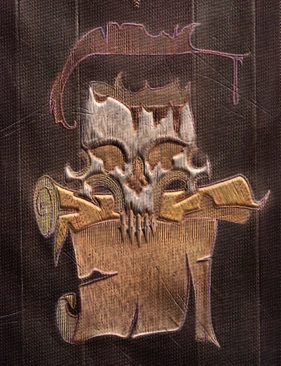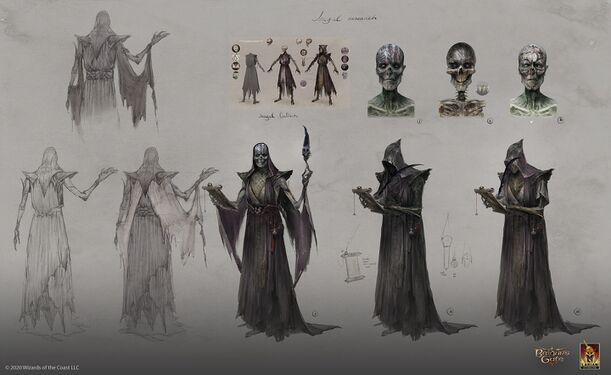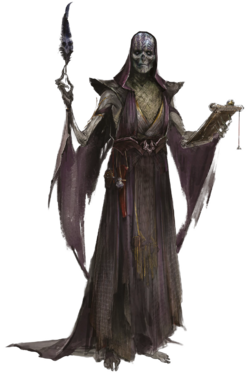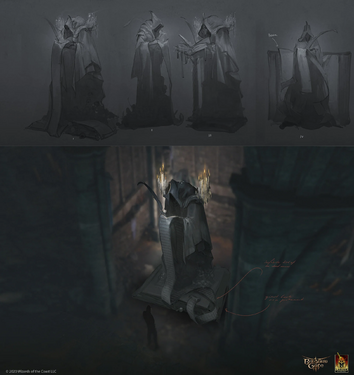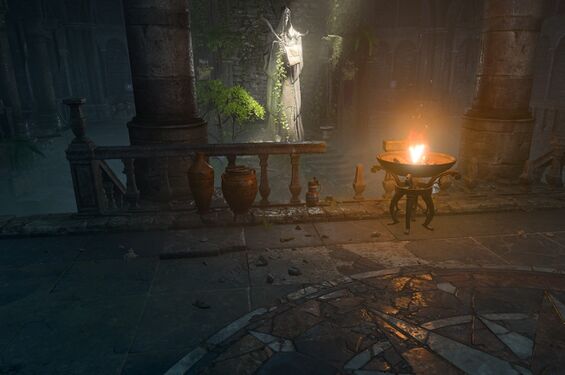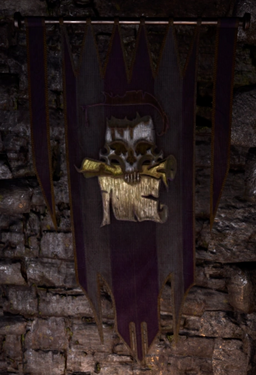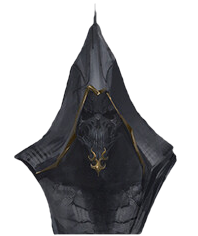Ad placeholder
Jergal
Jump to navigation
Jump to search
| Jergal | |
|---|---|
Jergal's symbol | |
| Information | |
| Race | Deity |
| “ | Jergal? This must be ancient - no one worships the Final Scribe anymore. |
„ |
| — Reacting to a statue in the Dank Crypt |
Jergal, also known as The Final Scribe, Lord of Bones, The Lord of the End of Everything and many other names, was god of death for aeons until the rise of the Dead Three.[1]
He is associated with the domains of Knowledge and Death.
Related items
Related literature
Withers
See also: Withers
While the game never states it outright, it is heavily implied that Withers is either an avatar of Jergal or Jergal himself.
- He is found in the Chapel of Jergal and scribes there bear Jergal's insignia. In Withers' official concept art (see gallery below) he is referred to as Jergal.
- The Crumbling Journal records another encounter with Jergal, with a description much alike Withers, and asking the same question that Withers does when you first meet him.[2]
- As a Paladin or Cleric you can feel divine energy from Withers. "He has a divine aspect, yes. A reflection of death itself. Eternal and inescapable." If you ask him if he's a god's Chosen he will refuse to answer questions in that regard.
- When a character dies and is resurrected by Withers, he will say "I strike thy name from the archives". Jergal is also known as "Nakasr, The Final Scribe" who is responsible for keeping record of the ultimate fate of all mortals.
- As a Cleric of Kelemvor, the player will have unique dialogue when talking to Withers. The player will sense something familiar about him upon first meeting. He will say unique lines such as "Thou walk with death, child of Kelemvor. That is enough for an understanding between us" and "No, although Kelemvor chose wise to bless one such as yourself" when replying to the player's questions.
- When talking to Withers in Moonrise Towers, the Party can note that he seems to know a lot about the Dead Three.
- In the after credits scene, Withers is seen talking to a mural of the Dead Three, expressing disappointment in their actions and telling them that he overestimated them. The way he speaks to the mural is that of someone who is familiar with the Three which Jergal would fit such a description.
Datamined content
According to datamined notes, Withers is Jergal. The datamined notes say that he is compelled by Helm to assist the players as penance.
- From the Chapel dialog notes:
| “ | After the party has slain a group of undead scholars, the judge of death--Jergal--climbs out of his sarcophagus to greet them. He has been locked inside for years by the god Helm to atone for his part in raising the Dead Three, wicked gods who are now plotting to conquer the realms. Jergal is emotionless and excessively formal, both resigned to his fate and that of others. He is here to assist the party because that is his divine oath, not out of any true desire to act. Players can attempt to goad or attack him, but to minimal effect, as he is functionally immortal. His only goal was to see their faces, so he can find them at camp later to offer further assistance. |
„ |
- From the Camp dialog notes:
| “ | Jergal, a god of the dead, awaits the player in camp. He is bound by the judgment of another god - Helm - to assist the players as penance for past crimes. He provides resurrection services to the players. |
„ |
- His texture files are named SKEL_HUM_M_<...>_Jergal.
Gallery
Statue of Jergal in the Dank Crypt.
References
- ↑ Death & Divinity: A Godly Guide
- ↑ Crumbling Journal: "Masked in gold, his skin fine and worn as parchment. Jergal, the death-keeper, the End of Everything. I asked what he needed of me. He asked a simple question: “What is the worth of a single mortal's life?” "
External links
 Jergal on the Forgotten Realms Wiki
Jergal on the Forgotten Realms Wiki
